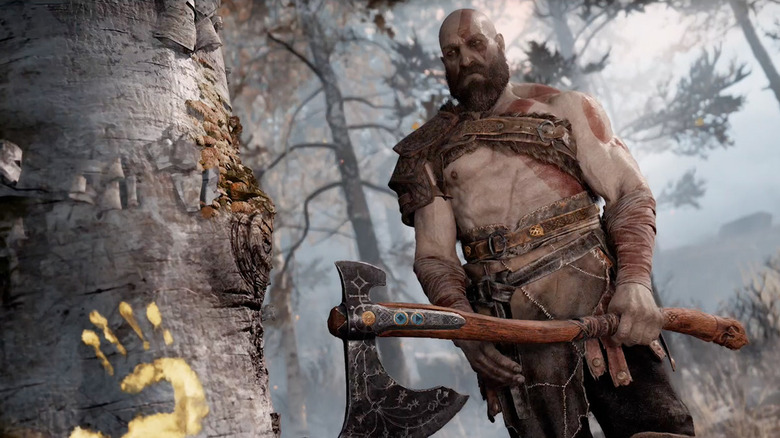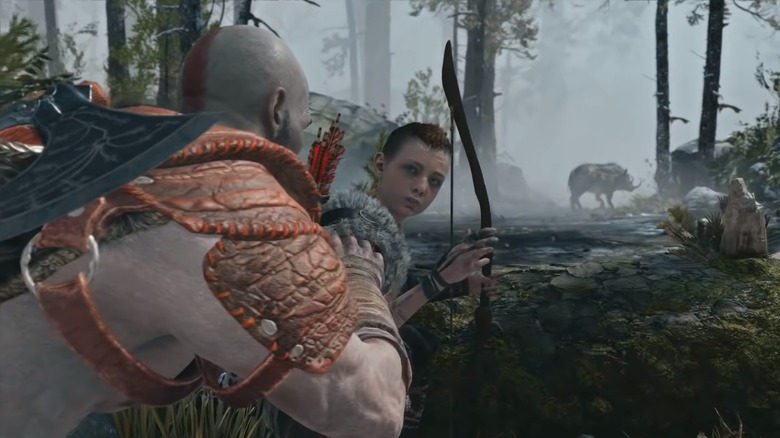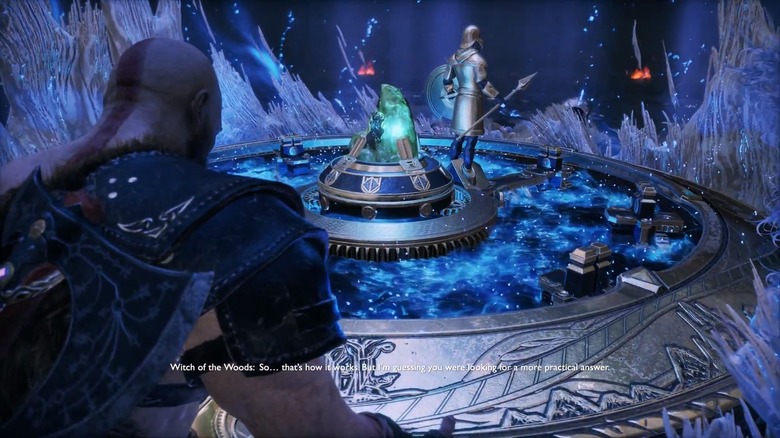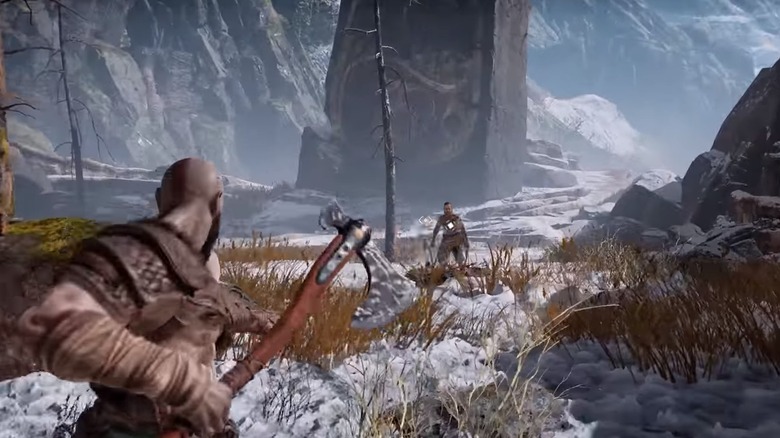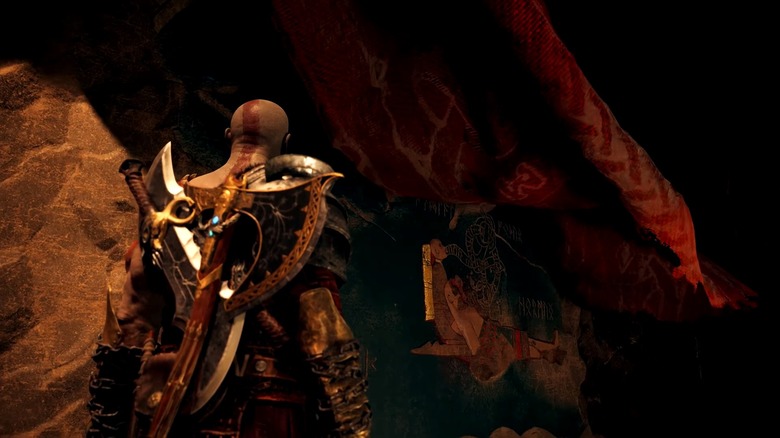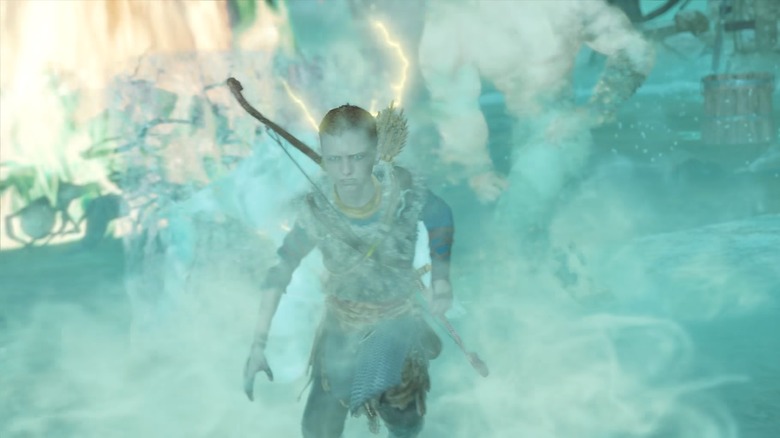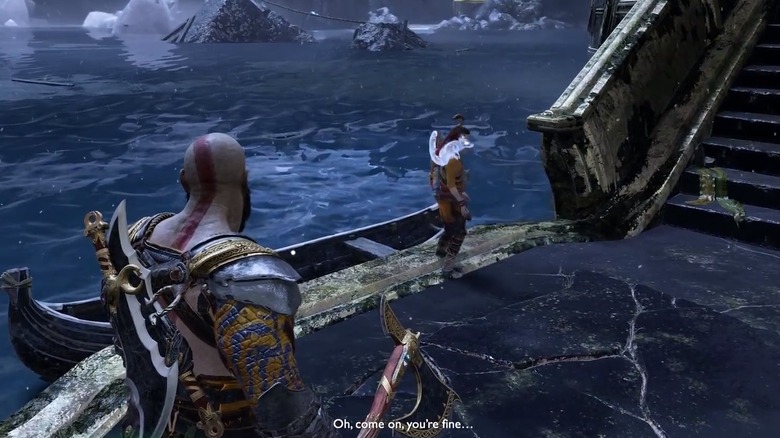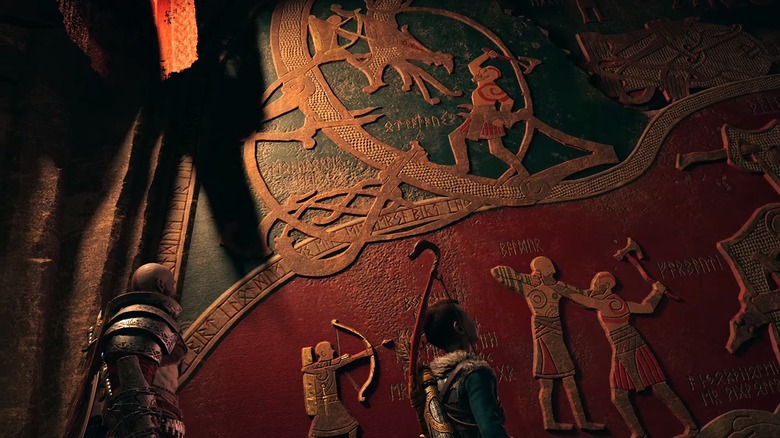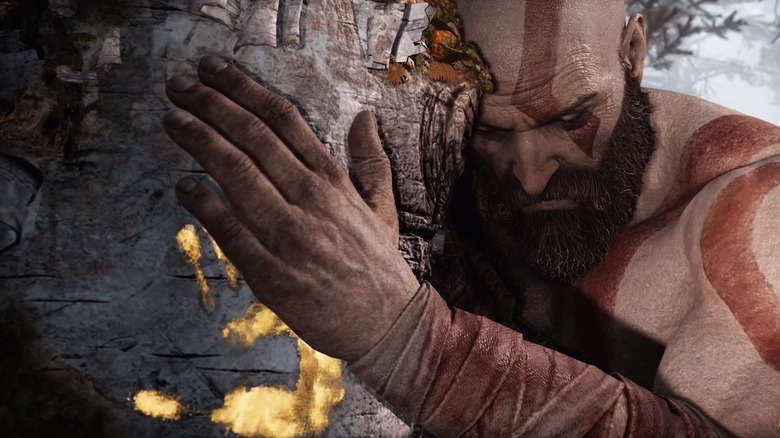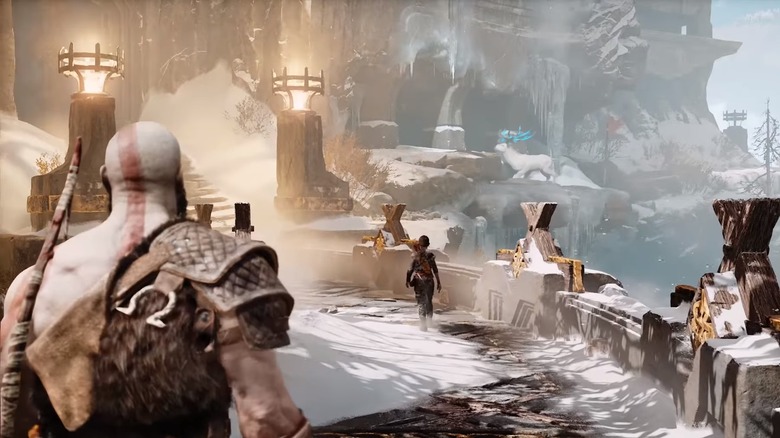Easter Eggs You Missed In God Of War
The God of War series is well-known for its rich stories, epic battles, and creative use of mythological figures. God of War, released on April 20, 2018 is no exception to this, expanding upon the already high standards set by previous titles.
Interweaving tales and figures from Norse myth, God of War contains a wealth of references and secrets to uncover. The game frequently drops hints about key story elements, many of which the developers have hidden in plain sight. Other Easter eggs are less obvious but well worth the effort to unearth.
The bulk of these details aren't throwaway nods at other franchises or pop culture references, but add depth to the setting and its cast of characters. God of War uses every moment to its advantage, telling a poignant tale of family and betrayal. Even its Easter eggs add more layers to the plot and pave the way for future games.
Significant spoilers await those who haven't finished the game. If you'd prefer to discover these hidden gems yourself, turn back now. Otherwise, enjoy your exploration of one of the best games that came out of 2018.
The Boar's Identity
During a hunting lesson, Kratos and Atreus encounter a boar with unique markings. Atreus wounds it with an arrow, prompting an extended chase as the creature attempts to flee. Separated during the chase, Kratos discovers Atreus after a frantic search, accompanied by a strange woman.
The woman identifies herself as The Witch of the Woods, claiming the boar is her friend and the last of its kind in all the realms. To atone for attacking the creature, Kratos agrees to carry it back to her house for further healing.
The Witch sends Atreus to gather a special healing component. During his absence, she and Kratos have an intriguing conversation. After Atreus returns and they gather the rest of the ingredients needed, she offers them safe passage out of the woods via a secret, underground pathway.
If you turn back from the cave and enter the house, you will trigger a cutscene. The Witch reveals the boar's identity, saying he is Hildisvíni, a shapeshifter from another realm. This is a reference to the figure of the same name in Norse mythology. It is also a veiled hint about The Witch's identity (Freya), as Hildisvíni was Freya's "battle swine" according to legend.
The reference about shapeshifting and Hildisvíni likely correspond to Óttar, Freya's protégé. In myth, Óttar disguised himself as Hildisvíni to learn more about his mysterious origins. This is one of many clever mythological references woven into the game.
Indeed.
TV, film, and voice actor Christopher Judge performed Kratos in the latest God of War installment. Among his many roles, Judge is most famous for playing the alien Teal'c in Stargate SG-1. Teal'c says "Indeed" many times throughout the series, making the word one of Stargate SG-1's most recognizable catchphrases.
After discovering the Mountain's Base, Atreus comments on the area, to which Kratos responds: "Indeed." When asked about delivering the line during recording on Twitter, Christopher Judge tweeted back, "Indeed," further endearing him to Stargate fans.
A circular device in the Realm Travel Room also looks nearly identical to the actual Stargate design in the series and original movie.
Like the Stargate, you're required to lock in symbols by spinning a circular device, enabling travel to other realms. The transportation fails, however, if the device on the other side is blocked or something has otherwise prevented it from functioning. Even the liquid-like material in the center matches, as does the beam of energy used to connect the two points.
Hidden in plain sight
In the closing minutes of the game, Kratos and Atreus enter Jötunheim, where they discover Faye's parting gift. Prophetic murals cover the walls of the structure, some documenting their journey so far, others hinting at trials yet to come. One of the many events depicted is their final fight with Baldur, which Atreus is quick to comment on. As remarkable as the image is, this isn't the first time it has appeared in the game. When you first fight The Stranger at the beginning of God of War, you throw him against a giant stone slab. This slab contains a faded version of the part of the mural that predicted your final encounter with Baldur.
The mysterious mural is visible in the background several times throughout the fight. While Faye likely placed it there, there is no clear sign of when or why. Perhaps this was one of her earliest visions, a sort of prototype created before assembling the display in Jötunheim. The mural's condition implies that it has been there for a while, yet the proximity to Kratos' home makes you wonder why he never noticed it there before. This is one of many mysteries within God of War still waiting to be solved.
Atreus' final form
The end of God of War reveals that Atreus is really Loki, the trickster god of myth; it's the name his mother wanted for him. However, there are a few veiled Easter eggs throughout the game that foreshadow this reveal.
Symbols hidden around Kratos' house, accessible from the beginning of the game, spell out "LOKI."
When Atreus learns he is a god, his first question is whether he can turn into a wolf. In Norse mythology, Loki was well known for being a shapeshifter. He also fathered Fenrir, the monstrous wolf who, according to prophecy, kills Odin during Ragnarok.
There also seems to be an Avengers Easter egg following one of the combats, referencing the scene when Hulk smashes Loki into the ground repeatedly. After defeating Grendel of the Frost and Grendel of the Ashes, Atreus says "puny troll." In a similar fashion, Hulk says "puny god" after defeating Loki in The Avengers.
Later, the World Serpent says Atreus seems familiar to him. In Norse mythology, Loki is the father of the World Serpent, who, according to Mimir, is prophesied to be shunted back in time by Thor when they fight during Ragnarok.
Even gods have daddy issues
In God of War 2, Zeus says "The cycle ends here" as he betrays and kills Kratos. This is a reference to Zeus' paranoid belief that Kratos would continue the mythological cycle of patricide, just as Cronos killed Ouranus and Zeus later killed Cronos.
Previously unaware of his lineage, Kratos later learns from Athena that Zeus is his father. Father or not, Kratos, intent on having his revenge, kills Zeus at the conclusion of God of War 3.
In 2018's God of War, things come full circle. During a confrontation with Freya, Baldur nearly strangles her to death. However, Kratos intervenes at the last moment. Before killing Baldur for the second and final time, Kratos says, "The cycle ends here," a direct callback to Zeus' own words in God of War 2. In this instance, Kratos is stopping a son from killing his mother.
While leaving Hel, you see an illusion of Zeus and Kratos fighting, a replica of the battle that takes place at the end of God of War 3. The game then snaps into first-person, the only time it uses this perspective. The same perspective switch happened during God of War 3 when Kratos delivered the final blows to Zeus. Atreus pulls his father back into third-person, showing the strength of the bond between them.
The squirrel with a mouth
Kratos and Atreus can access the Light Elf Outpost after the water recedes a second time. At the top of the outpost is a legendary chest which you can only reach after finding a series of runes and activating a realm tear.
Inside the chest is the Bitter Squirrel summon, aka, Ratatoskr. As the name implies, Ratatoskr is a smart-mouthed squirrel who begrudgingly digs up health and Spartan rage energy. His efforts are accompanied by an endless array of scathing insults and complaints. Some of his best quotes include: "Eat this!", "Freeloader!", and "I want you to know I have rabies. You should probably get tested."
Ratatoskr is a figure from Norse mythology who carried messages along the Tree of Life. Known as a troublemaker, he frequently embellished the messages he delivered. These embellishments stirred animosity between the eagle at the top of the tree and Nidhogg, the dragon who dwelled at the bottom.
As his accusations often caused damage to the Tree of Life, such as inciting Nidhogg to gnaw on its roots, it's possible Ratatoskr's intentions were darker than they appeared at first glance. Though he seems harmless enough in God of War, he is Atreus' summon. Perhaps he'll have a hand in inciting Ragnarok or at least enjoy the fireworks as the world falls apart.
Who is Kratos?
Several phrases written in the runic alphabet accompany the images on the prophetic mural in Jötunheim. The rune engraved next to Kratos's image translates to "Fárbauti," hinting at how Kratos may fit into the Norse pantheon.
In Norse mythology, Fárbauti was a giant married to Laufey (Faye). Both were the parents of Loki, who, according to the mural, is Atreus. This raises questions about Kratos' origins, as the games have always depicted him as a Spartan.
In the lower, right-hand corner of the game's menu are two wooden carvings that resemble Kratos and Atreus. Kratos' carving appears to be missing the eye from its left eye socket. Odin, ruler of Asgard, is known for missing his left eye. Kratos also mimics other events associated with Odin throughout the game, such as carrying around Mimir's severed head.
Is Kratos Fárbauti, Odin, or neither? God of War seems to send mixed signals here. With hints of time travel present within the game, anything may be possible.
The Golden Touch
The game starts with Kratos cutting down a tree marked with a golden handprint. You then encounter golden markers placed throughout the world, indicating areas where the characters can climb.
At the other end of the story, on the final cliff you traverse to spread Faye's ashes is another golden marking, accompanied by a golden handprint. Atreus comments on the marking, saying it was his mother's and that she had been guiding them throughout their journey.
During an interview, God of War director Cory Barlog revealed that Faye placed all the golden markings ("visual language") in the game. She prophesied Kratos and Atreus' entire journey and made sure they reached their destination by creating the golden path. This includes the golden handprint at the beginning, which prompted them to begin their quest.
By marking their path, Faye ensured that Kratos and Atreus would not get distracted from their task. Though simple on the surface, the golden markers show just how powerful Faye was. Cory Barlog called her an "almost omnipresent character" for both the protagonists and the player.
In choosing to include these markings, the creators added key depth to Faye's character and the game as a whole. If she had not taken action, the story itself would have never unfolded.
E3-inspired hijinks
The original E3 2016 trailer contained an epic scene featuring a troll who emerges from beneath a bridge as Atreus and Kratos are crossing. The troll gets in a few good hits before Kratos tosses Atreus his bow and they jump into combat.
In the actual game, the troll doesn't appear until a later scene. Atreus comments on its absence, saying, "I half-expected there to be a troll under that bridge." This is one of many times SIE Santa Monica Studio showed their sense of humor, and their dedication to keeping players on their toes.
E3 2016 inspired more than one humorous addition to God of War. When Atreus was first introduced at the E3 2016 reveal, GameSpot allegedly said his name was "Charlie" before Sony released his actual name. Upon hearing this, an amused Cory Barlog promised to include the name in the game at some point. He made good on his promise, naming the turtle under which the Witch of the Wood's home is located "Charlie."
This flexibility, attention to detail, and tongue-in-cheek writing put forth by the creative team are part of what make God of War such a memorable experience.

